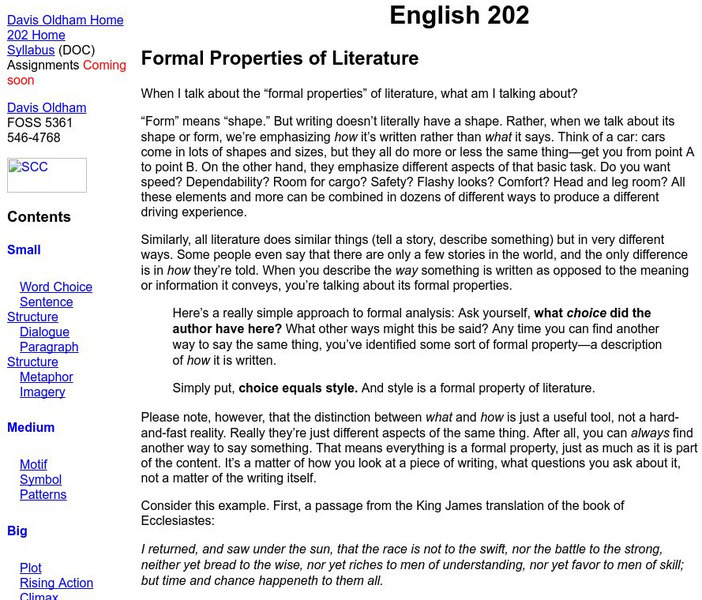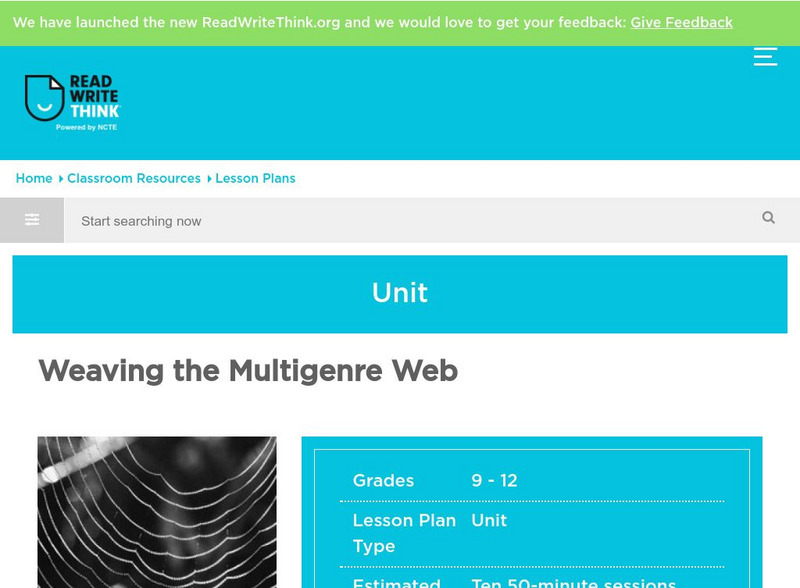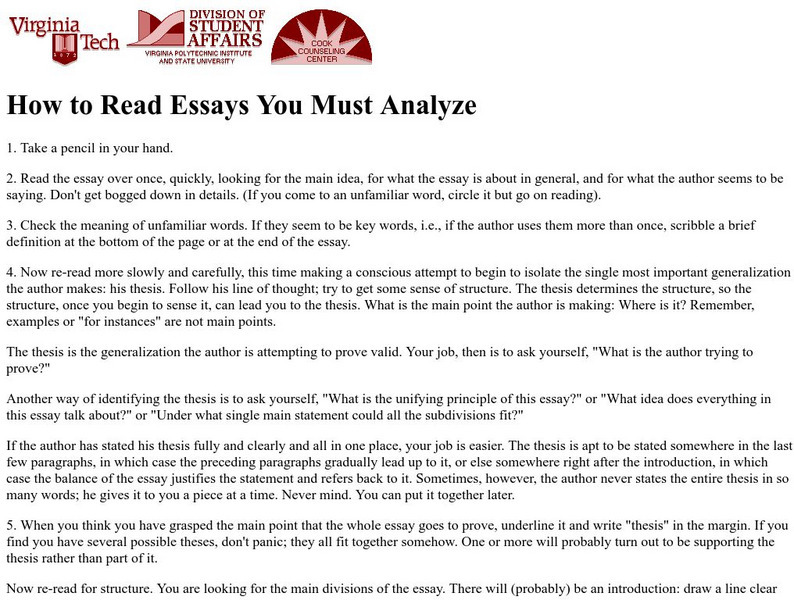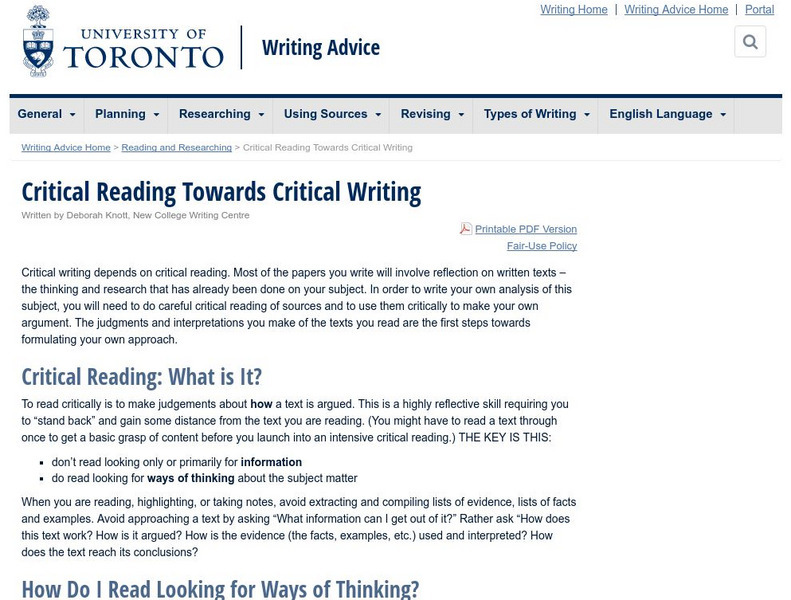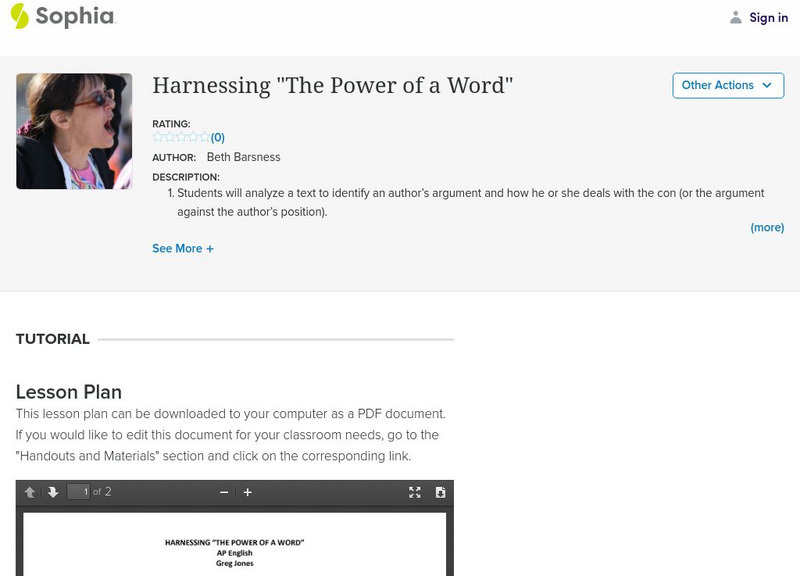Northern Virginia Community College
Northern Virginia Community College: How to Analyze Literature
In addition to briefly explaining the reason for analyzing a work of literature, this site provides the definition of key terms used in literary analysis. W.11-12.9a Amer Lit 18th,19th, 20th cen/Analy
Other
Mo Dept. Of Ed.: Analyzing and Evaluating Literary Works
Lesson plan designed for eleventh graders. Students analyze and evaluate a short story for elements of literary works such as theme, mood, word choice, imagery, tone, and main idea. Includes a student handout and a scoring guide. It...
Other
Ic You See: T Is for Thinking: Guide to Critical Thinking
This clearly presented tutorial can be used by individuals or could be presented to a class. Be sure to take the interactive quiz for some thought-provoking exercises.
San Jose State University
San Jose State: Writing a Winning Statement of Purpose [Pdf]
How do you write a winning statement of purpose? This is a clear and comprehensive explanation of how to approach and write an essay from the San Jose State University. Practice exercises are given at the end.
Other
Shoreline Community College: Formal Properties of Literature
As students become more aware of text complexity, an understanding of the formal properties of literature becomes more important. This is an excellent examination of the kinds of choices writers make that change the way readers receive...
Grammarly
Grammarly Handbook: Analysis
This page explains that analysis is crucial to the success of a paper as it answers the questions how and why and shows the reader that the writing is knowledgable. Logic and development work together to make the analysis clear. Examples...
Other
Suny: Conventions of Writing Papers About Literature
A professor's excellent explanation of how to write a professional sounding essay. Covers all aspects of an essay, and detailed examples give information on exactly how to write the essay.
ReadWriteThink
Read Write Think: Weaving the Multigenre Web
Students analyze the elements of a novel in many different genres and then hyperlink these pieces together on student-constructed Websites.
Grammarly
Grammarly Handbook: Organize Your Thoughts in Patterns
Tips on organizing ideas in an essay.
Virginia Tech
How to Read Essays You Must Analyze
Provides a detailed discussion on how to approach an essay for analysis.
PBS
Pbs News Hour: Responding to Quotes and Aphorisms
The objective of this lesson plan is to teach students about responding to quotes and aphorisms. This site features a lesson plan with detailed information.
Other
Grays Harbor College: Writing Essays: Four Tips
This resource explores four tips for writers: "Center Your Thinking," "Organize Your Thinking," "Specify Your Thoughts," and "Present Your Thoughts Clearly." The information is presented in an easy-to-follow outline with examples given...
E Reading Worksheets
E Reading Worksheets: Tone Worksheets and Lessons
This learning module provides remediation and extra practice with identifying an author's tone. Reinforcement for understanding author's tone is provided through the five different worksheets and a mini-lesson. CCSS.ELA-Literacy.CCRA.R.4
Science Education Resource Center at Carleton College
Serc: Reading Reflections
An exercise consisting of three reflective questions that students respond to after completing an assigned reading in any curriculum area. The task promotes skills in critical thinking and self-assessment.
Goshen College
Goshen College: Literary Analysis Guide
This resource not only explains how to analyze a text, but also, provides student examples of literary texts. W.9-10.9b Research/Argum, RI.11-12.5 Evaluate text structure
Colorado State University
Colorado State Writing Center: Critical Reading
In-depth instructions on critical reading with lots of links to more reading guides and activities. A good site to help improve reading skills to become a better writer.
University of Toronto (Canada)
University of Toronto: Critical Reading Towards Critical Writing
Aimed particularly towards writing about non-fiction, this site describes ways to think about what you read so you can write more clearly. Focuses on analyzing the "ways of thinking" that an author uses so you can evaluate the validity...
Sophia Learning
Sophia: Harnessing "The Power of a Word"
In this PDF lesson plan, students will analyze the text "The Power of a Word" by Leonard Pitts, Jr. to identify an author's argument and how he deals with the counterargument. Students will extend the argument by agreeing or disagreeing...
Sophia Learning
Sophia: Reading Strategies: Tutorial
In this slideshow tutorial, students will review different types of reading strategies to promote comprehension of text. The strategies included are the following: making predictions, visualizing, questioning the text, retelling,...
Sophia Learning
Sophia: Referencing the Author's Purpose
This lesson explains how to reference an author's purpose when answering a reading comprehension question. This tutorial shares an audio version of the lesson's content. [3:14] RI.11-12.6 Eval Purpose, Rhetoric, Style
Sophia Learning
Sophia: Rhetorical Analysis of "So This Was Adolescence"
This PDF lesson plan prepares students for multiple portions of the AP Language and Composition exam (specifically, the multiple choice section and the rhetorical analysis prompt) by analyzing a brief text which students will be able to...
Sophia Learning
Sophia: Selecting Topics for Literary Analysis
A series of three PDF documents providing definitions of commonly used terms when preparing to write a literary analysis, explaining how to comment on a literary text, and demonstrating the process of analyzing the literary text "Hills...
Colorado State University
Writing@csu Guide: Understanding Writing Situations
In this guide, you can learn more about the situations in which writers and readers find themselves and the physical, social, cultural, and historical contexts that shape them. Click on each of the links on the right to learn about the...



